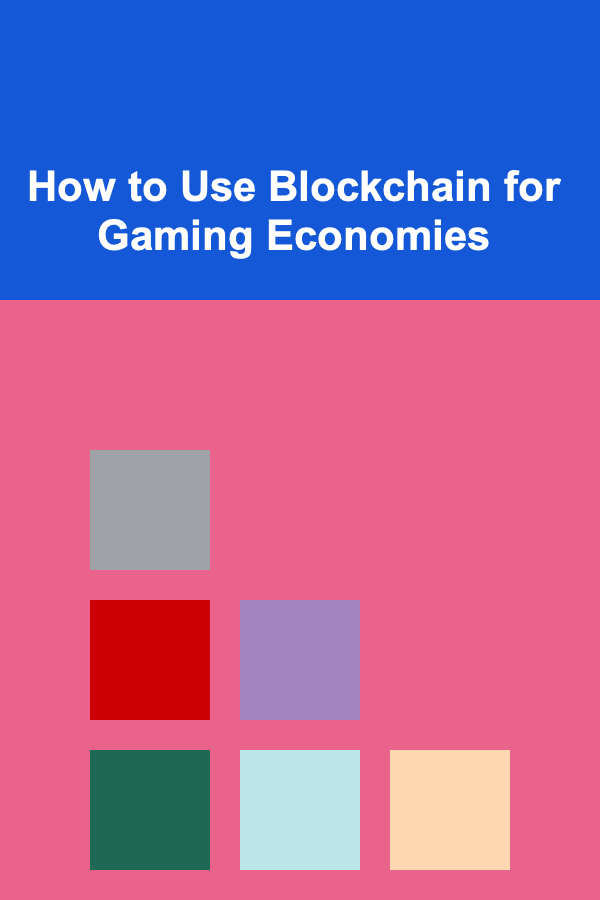
How to Use Blockchain for Gaming Economies
ebook include PDF & Audio bundle (Micro Guide)
$12.99$6.99
Limited Time Offer! Order within the next:

The intersection of blockchain technology and gaming economies has rapidly become a topic of immense interest and innovation. As blockchain continues to reshape industries from finance to healthcare, its potential to revolutionize gaming is becoming more apparent. Blockchain's unique capabilities, particularly its decentralized nature, transparency, and immutability, offer a fresh way to approach in-game economies, digital ownership, and player engagement. This article explores the various ways blockchain can be leveraged in gaming, with a particular focus on gaming economies and how this can impact both developers and players.
Understanding Blockchain Technology
Before diving into how blockchain can be applied to gaming economies, it's essential to understand what blockchain is and why it holds such promise for the gaming industry.
What is Blockchain?
Blockchain is a distributed ledger technology that allows data to be stored across a network of computers (also known as nodes) in a way that ensures its transparency, security, and immutability. Each piece of data is stored in a "block," and these blocks are linked together in a "chain," hence the name blockchain. One of the most appealing aspects of blockchain is that it operates in a decentralized manner, meaning no single entity controls the network. This decentralization is what makes blockchain particularly appealing for industries like gaming, where players often feel disconnected from the in-game economies and lack control over their digital assets.
Key Features of Blockchain
- Decentralization: No single point of control, reducing the risk of censorship or unfair influence from central authorities.
- Transparency: All transactions are visible to participants in the network, allowing players to track in-game purchases and trades transparently.
- Immutability: Once a transaction is recorded, it cannot be changed or tampered with, ensuring a trustworthy and secure environment for digital transactions.
- Security: Blockchain's cryptographic security makes it difficult for hackers to alter data or conduct fraudulent activities.
- Ownership: Blockchain allows for true digital ownership of assets. Players can own in-game items, currencies, or even characters in a way that is verifiable and transferable.
The Impact of Blockchain on Gaming Economies
Gaming economies have traditionally been controlled by game developers or publishers. They determine the in-game currency, the pricing of items, and how virtual goods are distributed or traded. However, with the integration of blockchain, the paradigm shifts significantly. Blockchain can fundamentally alter how these economies function by offering players more control and ownership over their assets and providing more transparent and decentralized mechanisms for exchanging value.
1. Digital Asset Ownership and NFTs
In traditional gaming, in-game assets such as skins, weapons, and characters are owned by the game developer or publisher, and players only have the right to use these assets within the game. If the game shuts down or the publisher decides to discontinue support, players lose access to these assets.
Blockchain, however, allows for the creation of Non-Fungible Tokens (NFTs), which are unique digital assets that represent ownership of in-game items, collectibles, or even characters. Each NFT is verifiable on the blockchain, ensuring that the owner has true, transferable ownership of the asset. This creates a whole new dynamic for in-game economies, as players can buy, sell, or trade NFTs both within and outside of the game.
For example, a player might own a rare in-game item that is represented by an NFT. This item could be sold to other players or traded across different games, creating a decentralized market where players can monetize their time and effort within the game. This also allows for the creation of cross-game economies, where assets from one game could be used in another, provided both games support the same blockchain technology.
2. Decentralized In-Game Currencies
In traditional gaming, in-game currencies are centralized and controlled by the game developer. Players exchange real-world money for virtual currency, which can be spent on items, upgrades, or other game-related features. However, these currencies are limited to the game in which they are used, and they have no intrinsic value outside of the game.
Blockchain enables the creation of decentralized cryptocurrencies that can function as in-game currencies. These cryptocurrencies are not controlled by any single entity, which means they can be traded, transferred, or exchanged freely within a decentralized economy. By using blockchain-based tokens or coins, game developers can create ecosystems where players can engage in meaningful economic exchanges without relying on centralized platforms or banks.
For instance, a blockchain-based game might issue a native cryptocurrency that players can use to purchase items or access premium content. These tokens could be traded on external cryptocurrency exchanges, giving them real-world value. Furthermore, because these tokens are based on blockchain, their transactions are secure, transparent, and immutable, ensuring a level of trust and accountability in the gaming economy.
3. Play-to-Earn (P2E) Models
The concept of Play-to-Earn (P2E) has gained traction with the rise of blockchain technology in gaming. In traditional gaming, players invest time and money into a game, but they typically don't have any opportunity to earn real-world value for their efforts. Blockchain enables a shift toward P2E models, where players can earn cryptocurrency or NFTs by playing the game.
P2E models offer a dual advantage: players can earn rewards for their time and effort, while developers can create more engaging and rewarding experiences that incentivize players to continue playing. For example, in a P2E game, players might complete missions, level up, or create in-game items that can be traded for cryptocurrency or NFTs. These assets have real-world value and can be sold or exchanged, creating a self-sustaining economy within the game.
4. Decentralized Autonomous Organizations (DAOs)
Another innovative way blockchain is transforming gaming economies is through the use of Decentralized Autonomous Organizations (DAOs). A DAO is a governance model in which the rules and decision-making processes are encoded on the blockchain, allowing for decentralized control by the community.
In the context of gaming, a DAO could be used to manage the economy of a game or a network of games. Players who hold tokens or NFTs could vote on important decisions, such as changes to in-game economies, the introduction of new features, or how the game's funds are allocated. This creates a more democratic and community-driven model, where the players have a say in how the game evolves.
DAOs also provide a way for game developers to engage their player base in meaningful ways, fostering a sense of ownership and collaboration. Players could participate in governance by staking their tokens or NFTs, making the process more inclusive and rewarding for the community.
Practical Applications of Blockchain in Gaming Economies
Now that we've established how blockchain can be used to create new types of gaming economies, let's look at some practical applications where blockchain technology is already making an impact in the gaming world.
1. Blockchain-based Games
Several game developers have already started integrating blockchain into their games, creating ecosystems that reward players for their participation. Games like Axie Infinity , Decentraland , and The Sandbox have embraced blockchain technology to create decentralized economies where players can buy, sell, and trade virtual goods and assets.
Axie Infinity, for example, uses blockchain to enable players to breed, battle, and trade creatures known as "Axies." Players can earn cryptocurrency through gameplay, creating a vibrant in-game economy based on blockchain. Similarly, Decentraland and The Sandbox use blockchain to allow players to buy virtual land, build experiences, and monetize their creations.
2. In-Game Marketplaces
Blockchain also enables the creation of decentralized in-game marketplaces. Traditionally, in-game items are bought and sold through centralized platforms controlled by the game developer. However, with blockchain, players can trade in-game items directly with one another, using smart contracts to facilitate secure, transparent transactions.
These decentralized marketplaces open up new revenue streams for players and developers alike. For example, a player might create custom skins or items within a game and sell them to other players through a blockchain-based marketplace. Because blockchain ensures the authenticity and ownership of items, buyers can be confident that they are purchasing legitimate assets.
3. Interoperable Assets
One of the most exciting possibilities for blockchain in gaming is the ability to create interoperable assets. With blockchain, assets from one game can potentially be used in another game, creating a seamless experience for players. This could include items like skins, weapons, or even characters that can be transferred from one game to another, provided both games use compatible blockchain networks.
Interoperability can create a more fluid and dynamic gaming economy, where players are not restricted to the economies of individual games but can move their assets between different virtual worlds. This opens up exciting possibilities for cross-game collaborations and multi-game economies.
Challenges and Considerations
While blockchain offers significant potential for gaming economies, there are several challenges and considerations that need to be addressed.
1. Scalability and Performance
Blockchain technology, particularly public blockchains like Ethereum, can sometimes face scalability issues. As more players engage with the game and more transactions are made, the blockchain network can become congested, leading to slower transaction times and higher fees. Game developers will need to consider how to ensure that the blockchain can handle large volumes of transactions while maintaining performance and user experience.
2. Regulatory and Legal Issues
The integration of blockchain into gaming economies raises several regulatory and legal concerns. Issues such as digital asset ownership, taxation, and the classification of in-game currencies or NFTs as securities are still largely undefined in many jurisdictions. Developers will need to navigate these complex legal landscapes to ensure their games comply with local regulations.
3. Environmental Impact
The environmental impact of blockchain, particularly proof-of-work consensus mechanisms like those used by Bitcoin and Ethereum, has raised concerns due to the high energy consumption associated with mining activities. While some blockchain networks are moving toward more energy-efficient models, this remains a concern for developers looking to implement blockchain in their games.
Conclusion
Blockchain has the potential to transform gaming economies in profound ways, offering players true ownership of in-game assets, creating decentralized marketplaces, and enabling innovative models like Play-to-Earn. By leveraging the unique features of blockchain, game developers can create more engaging, transparent, and rewarding experiences for players while building self-sustaining economies that extend beyond the confines of individual games.
While there are still challenges to overcome, the continued development of blockchain technology and its integration into the gaming world will likely lead to a new era of gaming economies that prioritize player ownership, community governance, and innovation. The future of gaming is undoubtedly blockchain-powered, and its impact will continue to evolve in exciting and unexpected ways.

How to Create a Coastal Look for Your Home on a Budget
Read More
How to Implement a Shared Chore Chart
Read More
How to Travel the World and Earn Money: A Step-by-Step Guide
Read More
How to Use YouTube to Make Money: A Deep Dive into the Business of Content Creation
Read More
How to Cope with Fertility Struggles
Read More
The Step-by-Step Guide to Home Brewing
Read MoreOther Products

How to Create a Coastal Look for Your Home on a Budget
Read More
How to Implement a Shared Chore Chart
Read More
How to Travel the World and Earn Money: A Step-by-Step Guide
Read More
How to Use YouTube to Make Money: A Deep Dive into the Business of Content Creation
Read More
How to Cope with Fertility Struggles
Read More